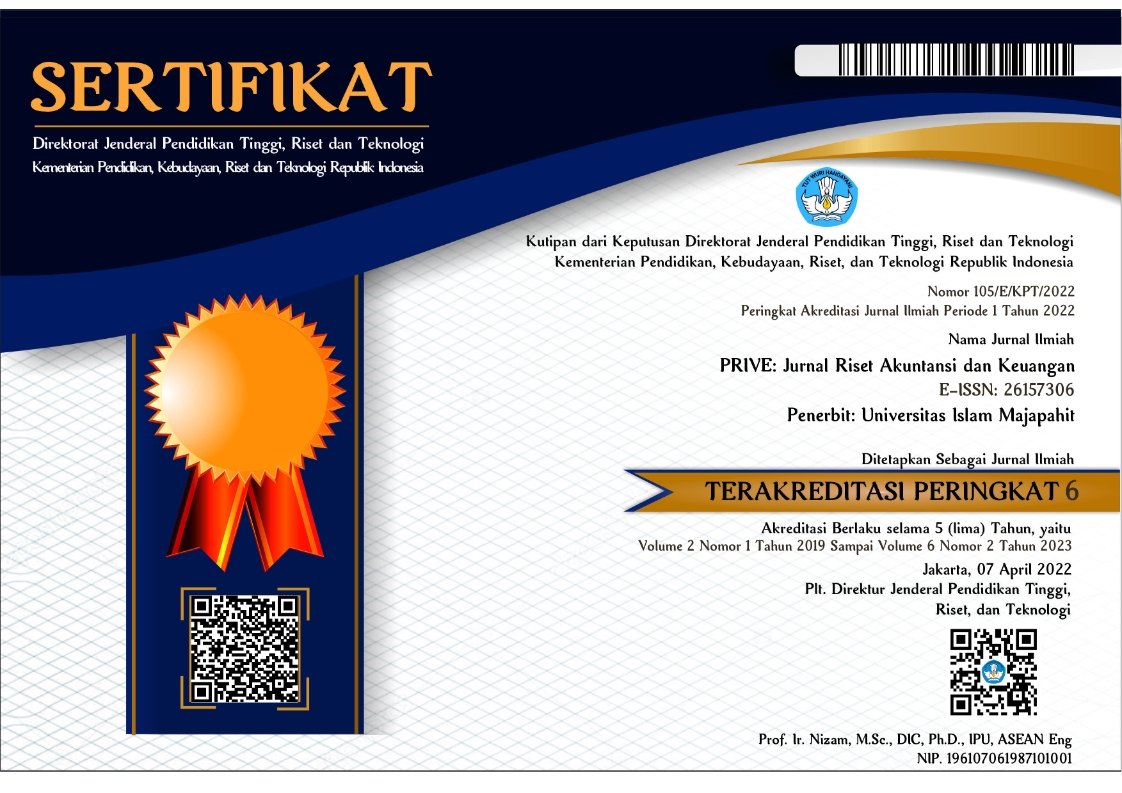Analisis Varians Untuk Mengukur Efisiensi dan Efektifitas Anggaran Perusahaan PG Gempolkrep Tahun 2014 – 2015
DOI:
https://doi.org/10.36815/prive.v3i2.830Keywords:
sales budget, production budget, varians analysis, effectiveness, efficiencyAbstract
The budget functions as an aspect of planning and supervision in the company's operational activities. The budget must be able to adjust the plans made for various parts of the company, so that one activity plan will be in harmony with another. Efficiency is the relationship between goods and services produced by an activity and the resources used. An activity is said to be efficient if it is able to produce certain outputs with the lowest possible input or with certain inputs it is able to produce the maximum output (spending well). Meanwhile, effectiveness is the relationship between the output and the goals or objectives that must be achieved. Operational activities are said to be effective if the activity process achieves the final policy goals and objectives (spending wisely). The purpose of this study was to determine the variance of the sales and production budget of PG. Gempolkrep Mojokerto 2014 - 2015 and measures the level of efficiency and effectiveness of PG's sales and production budget. Gempolkrep Mojokerto 2014 - 2015. The analysis method used is analysis of variance. The results of this study contained unfavorable variances in the sales budget for 2014 and 2015. Production budgets for 2014 and 2015 showed favorable variances. The use of the budget for 2014 and 2015 is less than 80% or is in the efficient category. The company's budget performance for 2014 - 2015 is in the range of less than 80% or is in the less effective category.
References
Abdurahmat. 2003. Pengertian Tentang Efektifitas. http://othenk.blogspot.com. Diakses tanggal 25 September 2016.
Ariel Sharon Sumenge. 2013. Analisis Efektifitas dan Efisiensi Pelaksanaan Anggaran Belanja Badan Perencanaan Pembangunan Daerah (BAPPEDA) Minahasa Selatan. Manado : Fakultas Ekonomi Universitas Sam Ratulangi.
Bastian Bustani dan Nurlela. 2009. Akuntansi Biaya : Kajian Teori dan Aplikasi, Edisi Kesatu. Jakarta : Mitra Wacana Media.
Christina, E.,et al. 2001. Anggaran Perusahaan. Jakarta : Penerbit Gramedia Pustaka Utama.
Deddi dan Ayuningtyas Hertanti. 2010. Akuntansi Sektor Publik. Jakarta : Salemba Empat.
Hansen, Don R., dan Maryanne M. Mowen. 2006. Akuntansi Manajerial Edisi ke-8. Jakarta : Salemba Empat.
Harun. 2008. Reformasi Akuntansi dan Manajemen Sektor Publik. Jakarta : PT. Gramedia Pustaka Utama.
Ihyaul Ulum. 2009. Audit Sektor Publik : Suatu Pengantar. Jakarta : Penerbit Bumi Aksara.
Kuncoro, Mudrajad. 2009. Metode Riset untuk Bisnis & Ekonomi. Edisi 3. Jakarta : Erlangga.
Kuswadi. 2005. Meningkatkan Laba Melalui Pendekatan Akuntansi Keuangan dan Akuntansi Biaya. Jakarta : Elex Media Komputindo.
M. Nafarin. 2004. Penganggaran Perusahaan. Jakarta : Salemba Empat.
Mardiasmo, 2002. Akuntansi Sektor Publik. Yogyakarta : Penerbit Andi.
Milton F. Usry dan Lawren H. Hammer dalam bukunya “Cost Accounting : planning & Control” 2002
Mulyadi. 1995. Akuntansi Biaya. Yogyakarta : Penerbit FE UGM.
Mulyadi. 2008. Sistem Akuntansi. Jakarta : Salemba Empat.
Mulyadi. 2009. Akuntansi Biaya Edisi ke-5. Yogyakarta : UPP-STIM YKPN.
Munandar. 2001. Budgeting, Perencanaan Kerja , Pengkoordinasian Kerja, Pengawasan Kerja. Depok : Universitas Indonesia Press.
Nur Fitri Farjil dan Lili Syafitri. 2013. Analisis Biaya Standar Dalam Rangka Pengendalian Biaya Produksi Pada PT. Pusri Palembang. Jurusan Ekonomi Sekolah Tinggi Ilmu Ekonomi MDP.
Robert N Anthony dan Roger H. Hermanson. 2001. Management Control System. Jakarta : Salemba Empat.
Rony A. Rusli. 2002. Manajemen Pemasaran Edisi Millenium 2. Jakarta : PT. Prenhalindo.
Santoso, Eko. 2011. Efisiensi dan Efektivitas Pengelolaan Keuangan Daerah di Kabupaten Ngawi. Surakarta : Fakultas Ekonomi, Universitas Sebelas Maret.
Siregar, Narumondang Bulan. 2003. Penyusunan Anggaran Perusahaan Sebagai Alat Manajemen dalam Pencapaian Tujuan. Fakultas Ekonomi Universitas Sumatera Utara.
Sondang. P. Siagian. 2001. Manajemen Sumber Daya Manusia. Jakarta : Bumi Aksara.







